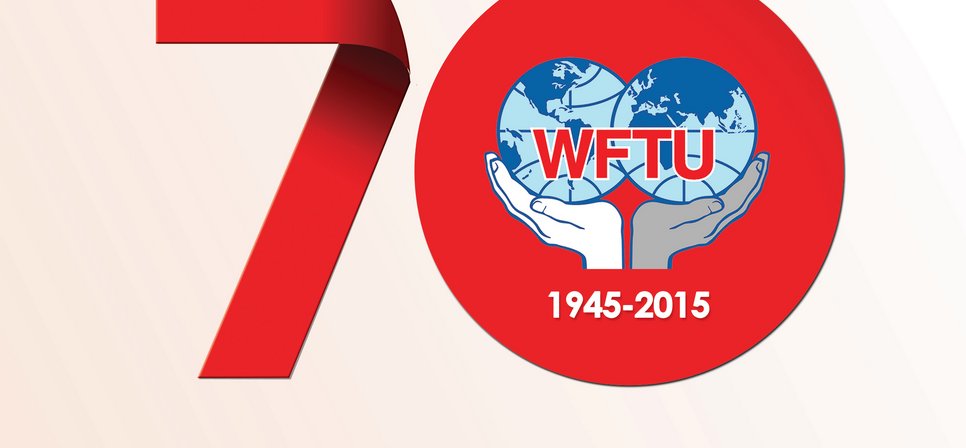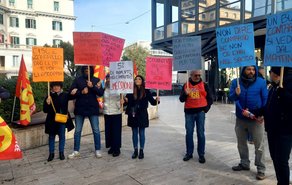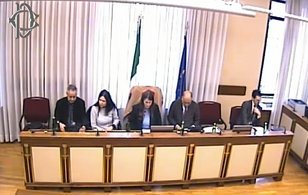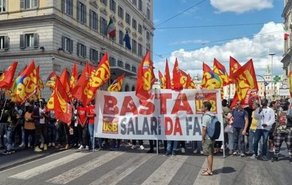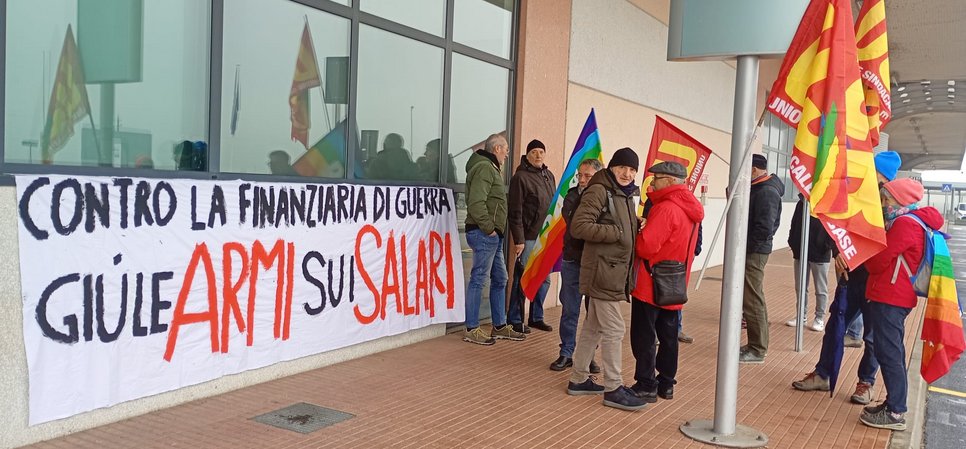Resolution - Invitation
Conference
Of Trade Unions of Telecommunications, IT and Call Centers of Europe
October 19, 2015, Brussels
Workers In Telecommunications, IT And Call Center Against The Multinationals
We Will Not Become Slaves of the 21st Century
The trade union organizations that co-sign this document met to discuss the situation the workers of telecommunications, IT and Call Centers in Europe experience, so as to organise a unified response against the multinationals and the monopolies supported by the European Union.
Telecommunications is a sector that employs hundreds of thousands of workers in Europe and is mainly controlled by big multinational, monopoly groups like Deutsche Telecom (T-mobile), Vodafone, Telefonica Movistar, Orange, British Telecom, Τeleperformance, Telecom Italia, Cyta etc. The multinationals of the sector utilized the antiworkers directives of the European Union and its implementation by the local governments in each country, so as to attack against the established labourrights of the old workers of the sector, creating a new generation with hundred thousands of young workers, who were hired, mainly, under worse working conditions, without the rights and gains of the previous generations
.The creation of the EU in 1992 and the signing of the Maastricht Treaty, laid the foundations for theprivatizations of a series of sectors, such as telecommunications. From 1992 until today, the Maastricht Treaty has been specified and evolved with many other treaties using as the most important criterion the deepening of the reforms so as to pave the way to maximum profitability of the big monopoly groups and the protection of their competitiveness.
The big multinationals own more than 50% of the market of the fixed telephony and internet network in the EU. Accordingly, the two main mobile telephony operators in each member-state control the 75% of the market on average by buying out or merging with companies that could not survive the competition. In telecommunications, the new fields of profitability are the packages of fixed network-mobile telephony-internet- TV, broadband and fiber optics. The centralization tendencies are leading to the creation of big monopoly groups, which clash for the
control of the market.
This path goes over the destruction of the wage rights, through wage cuts, the abolishing of employers contribution for Health and social security of the workers. This is why, even before the manifestation of the capitalist crisis, the workers were facing the abolition of the rights they had conquered with fierce and bloodshed struggles during the 19th and the 20th century.
Today the majority of the workers in the sector, especially in call centres are working in conditions of extreme intensification, flexible working hours, half wages, through outsourcing, with contracts of a few months to a few hours. Bigger victims of this situation are the young women workers and their right to motherhood.
Specific examples of this situation are
France: Suicides due to intensification in France Telecom
Greece: Deutsche Telecom-OTE, where the wages were cut 40% for the new workers
Spain: Since its privatization, Telefonica Movistar destroyed about 50.000 decent jobs in order to replace them by hundred thousands of subcontracted workers, submitted to increasing precarious working conditions.
Italy: The process of privatization of the telephone sector in fixed and mobile networks, has produced dismissals with the consequent increase in the levels of exploitation and the lowering of the joint union protections and wages. Between 2010 and 2013 it was destroyed 8% of jobs. In this period the temporary contracts grew from 13% to 27%. In the Call Centers the number of fixed-term contracts is 78%, of these, 40% are women workers.
Great responsibility for this situation falls to the employers’ trade unionism with its undermining role the workers’ resistance. It cultivates the ideology of “class collaboration”, of the dialogue between worker and multinational as if they have common interests. It undermined the Collective Contracts by accepting wage cuts and abolishment of rights, while even today it divides the workers between the Mother Companies and their subsidiaries, leaving thousands of young workers without trade union organisation. At the same time it cultivates the arguments of the monopolies such as for “competitiveness” and “growth” calling the workers to adopt demands against their interests.
For our daily action in a sector, where the multinational companies are dominant, it is necessary for the workers to be in direct communication with each other from country to country, to get informed about the developments and the plans of the employers, to develop common action and give a unified answer.
The updating, the exchange of information and experience should lead to the expression of solidarity with the struggles developed in the sector in every country, in support of the organizations that fight for Collective Contracts, in order to improve the salaries and the rights. Our task is to strengthen the class solidarity to counteract the persecution of employers and governments against unionists and workers
.Today we need a movement that fight against the multinationals, the European Union and their political representatives. A movement that has as its priority the realization of the contemporary needs of the working class must build strong and rooted unions with militant features in every workplace.
Today we need trade unions that will unite the workers based on the sector they work, against the divisions caused by the employers. This movement will bear the responsibility to organise the workers and increase the struggles against the multinationals and the monopolies, so as to defend and expand the rights of the workers, to demand collective contracts.
In this direction we call for a conference of the militant forces of the sector in Europe, which will specify such matters, expand the experience, support and coordinate organizations which fight against the common enemy, in each country.
The Trade Union organisations of PAME-Greece, CoBas-Spain, USB-Italy and PEO-Cyprus take the responsibility to call a Conference of the Trade Unions of Telecommunications, IT and Call Centres sector in Brussels, in October 19, 2015, on the subject:
The Struggle of the Workers in Telecommunications, IT and Call Centers Against the Multinationals
Our common steps towards the conference will be propagated through a week of international action, to be held tentatively in early September through activities and communication among employees of multinational companies, to highlight the need to strengthen the fight in support of their class interests.
The struggle and the workers' demands are part of more general interest to have the
telecommunications that go to the criterion to satisfy the enlarged people’s needs for low cost, safe, qualitative Telecommunications and not for the profits of the business groups, something that demands telecommunications not to be a merchandise. In this path to overthrow the policy of commercialization of Telecommunications and the policies of the EU for liberalization of the sector, comes under the struggle for the overturn of the privatizations, for the complete safeguard of the wage and labour rights of the workers in the sector.
We Respond To the Multinationals With Organisation, Unity and Solidarity
USB Italy, PAME Greece, PEO Cyprus, CoBas Spain
Risoluzione - Invito
Conferenza
Dei sindacati delle telecomunicazioni, dell’ IT e dei Call Center d'Europa
19 Ottobre 2015, Bruxelles
"I lavoratori delle telecomunicazioni, e dei call center contro le multinazionali"
Noi non diventeremo gli schiavi del 21 ° secolo
Le organizzazioni sindacali co-firmatarie di questo documento, si sono incontrate per discutere della situazione e delle esperienze dei lavoratori delle telecomunicazioni, dell’ IT e dei Call Center in Europa, al fine di organizzare una risposta unitaria contro le multinazionali e i monopoli sostenuti dall'Unione Europea.
Le telecomunicazioni sono un settore che in Europa, impiega centinaia di migliaia di lavoratori ed è principalmente controllato da grandi multinazionali e gruppi monopolistici come Deutsche Telecom (T-Mobile), Vodafone, Telefonica Movistar, Orange, British Telecom, Τeleperformance, Telecom Italia, Cyta etc.
Le multinazionali del settore utilizzano le direttive anti-operaie dell'Unione europea applicate in ogni paese da parte dei governi locali, attaccando i diritti dei lavoratori attualmente in vigore per i lavoratori “anziani” del settore, creando così una nuova generazione composta da centinaia di migliaia di giovani lavoratori, che prevalentemente vengono assunti, con condizioni di lavoro peggiori, senza i diritti e le conquiste delle generazioni precedenti.
La creazione dell'Unione europea nel 1992 e la firma del Trattato di Maastricht, ha posto le basi per le privatizzazioni di una serie di settori, come appunto le telecomunicazioni.
Dal 1992 fino ad oggi, il trattato di Maastricht è stato sviluppato e dettagliato attraverso molti altri trattati, assumendo come criterio guida l'approfondimento delle riforme, in modo da spianare la strada al massimo profitto dei grandi gruppi monopolistici e tutelando così la loro competitività.
Le grandi multinazionali possiedono più del 50% del mercato della rete di telefonia fissa e internet in Europa.>Di conseguenza, i due principali operatori di telefonia mobile in ogni stato membro mediamente controllano ormai il 75% del mercato, grazie ad acquisizioni e fusioni con le società che non potevano sopravvivere alla concorrenza. Nel settore delle telecomunicazioni, i nuovi campi di redditività sono rappresentati dai pacchetti di rete di telefonia fissa- mobile-internet -TV, oltreché dalla banda larga e dalla fibra ottica. Le tendenze alla centralizzazione stanno portando alla creazione di grandi gruppi monopolistici, che si scontrano per il controllo del mercato.
Questo percorso va oltre la distruzione dei diritti salariali, i tagli i delle retribuzioni, l’eliminazione dei contributi per la salute e la previdenza sociale dei lavoratori.
Questo perché anche prima del manifestarsi della crisi capitalista, i lavoratori stavano affrontando l’abolizione dei diritti che avevano conquistato con lotte feroci e spargimento di sangue durante il 19 ° e il 20 ° secolo.
Oggi la maggior parte dei lavoratori del settore, soprattutto nei call center sta lavorando in condizioni di estremo sfruttamento, fatto di orari di lavoro flessibili, tagli dei salari, esternalizzazioni, con contratti di pochi mesi e con poche ore. Le maggiori vittime di questa situazione sono le giovani lavoratrici, che vedono negarsi il loro diritto alla maternità.
Esempi specifici di questa situazione sono
Francia: suicidi a causa dell’ intensificazione dello sfruttamento in France Telecom
Grecia: Deutsche Telecom-OTE, dove ai nuovi lavoratori i salari sono stati tagliati del 40%
Spagna: Fin dalla sua privatizzazione, Telefonica Movistar ha distrutto circa 50.000 posti di lavoro dignitosi, per sostituirli con centinaia di migliaia di lavoratori in subappalto, sottoposti a condizioni di lavoro sempre più precarie.
Italia: Il processo di privatizzazione del settore telefonico delle reti fisse e mobili, ha prodotto licenziamenti con il conseguente aumento dei livelli di sfruttamento e l'abbassamento delle tutele sindacali e riduzione dei salari. Tra il 2010 e il 2013 è stato distrutto l'8% dei posti di lavoro. In questo periodo i contratti a tempo determinato sono cresciuti dal 13% al 27%. Nei Call Center il numero di contratti a tempo determinato è salito al 78%, di questi, il 40% è costituito da donne lavoratrici.
Grande responsabilità di questa situazione ricade sul sindacalismo legato ai datori di lavoro, che ha assunto il ruolo di minare la resistenza dei lavoratori.Esso coltiva l'ideologia della "collaborazione di classe", del dialogo tra lavoratori e multinazionali come se questi avessero interessi comuni.
Ha indebolito i contratti collettivi accettando tagli salariali e l’abolizione dei diritti, e ancora oggi divide i lavoratori tra le società madri e le loro controllate, lasciando migliaia di giovani lavoratori, senza organizzazione sindacale.
Allo stesso tempo coltiva le argomentazioni dei monopoli, come per la "competitività" e la "crescita" chiamando i lavoratori ad adottare richieste contro i loro stessi interessi.
Per la nostra azione quotidiana in questo settore, dove le multinazionali sono dominanti, è necessario che i lavoratori siano in comunicazione diretta gli uni con gli altri da paese a paese, per informarsi sugli sviluppi delle strategie dei datori di lavoro, per l’ ampliamento dell’azione comune nell’ottica di una risposta unitaria.
L'aggiornamento, lo scambio di informazioni ed esperienze deve accompagnare l'espressione della solidarietà con le lotte sviluppate nel settore in tutti i paesi, a sostegno delle organizzazioni che si battono per i contratti collettivi, con lo scopo di migliorare i salari e dei diritti.
Il nostro compito è quello di rafforzare la solidarietà di classe per contrastare la persecuzione dei datori di lavoro e dei governi nei confronti di sindacalisti e lavoratori.
Oggi abbiamo bisogno di un movimento che lotti contro le multinazionali, l'Unione europea e i loro rappresentanti politici. Un movimento che si pone come priorità la realizzazione delle esigenze contemporanee della classe lavoratrice deve costruire sindacati radicati e forti, con caratteristiche militanti in ogni luogo di lavoro.
Oggi abbiamo bisogno di sindacati che riuniscano i lavoratori in base al settore in cui lavorano, contro le divisioni causate dai datori di lavoro. Questo movimento si assume la responsabilità di organizzare i lavoratori e sviluppare le lotte contro le multinazionali e i monopoli, in modo da difendere e ampliare i diritti dei lavoratori, per reclamare dei contratti collettivi.
A questo scopo chiamiamo una conferenza delle forze militanti del settore in Europa, che affronterà tali questioni: ampliare l'esperienza, sostenere e coordinare le organizzazioni che in ogni paese lottano contro il nemico comune.
Le organizzazioni sindacali del PAME-Grecia, Cobas-Spagna, USB-Italia e PEO-Cipro, si assumono la responsabilità di chiamare una conferenza dei sindacati del settore telecomunicazioni, IT e dei Call Center a Bruxelles, il 19 Ottobre 2015, sul tema :
"La lotta dei lavoratori nel settore delle telecomunicazioni, IT e dei Call Center"
I passaggi comuni verso la conferenza saranno propagandati attraverso una settimana di azione internazionale, che si terrà indicativamente all'inizio di settembre attraverso attività e la diffusione tra i dipendenti di aziende multinazionali, per evidenziare la necessità di rafforzare la lotta a sostegno dei propri interessi di classe.
La lotta e le richieste dei lavoratori sono parte di un interesse più generale teso ad ottenere delle telecomunicazioni che perseguano il criterio di soddisfare le necessità di una sempre più vasta popolazione che richiede un sistema di comunicazioni di qualità, a basso costo, sicuro e non orientato al profitto dei gruppi aziendali, qualcosa che chiede che le telecomunicazioni non siano una merce.
In questo percorso diretto a rovesciare la politica di commercializzazione delle Telecomunicazioni e le politiche dell'UE per la liberalizzazione del settore, rientra la lotta tesa a rigettare le privatizzazioni, per la completa salvaguardia dei salari e dei diritti dei lavoratori del settore .
Rispondiamo alle multinazionali con l’organizzazione, l’unità e la solidarietà

